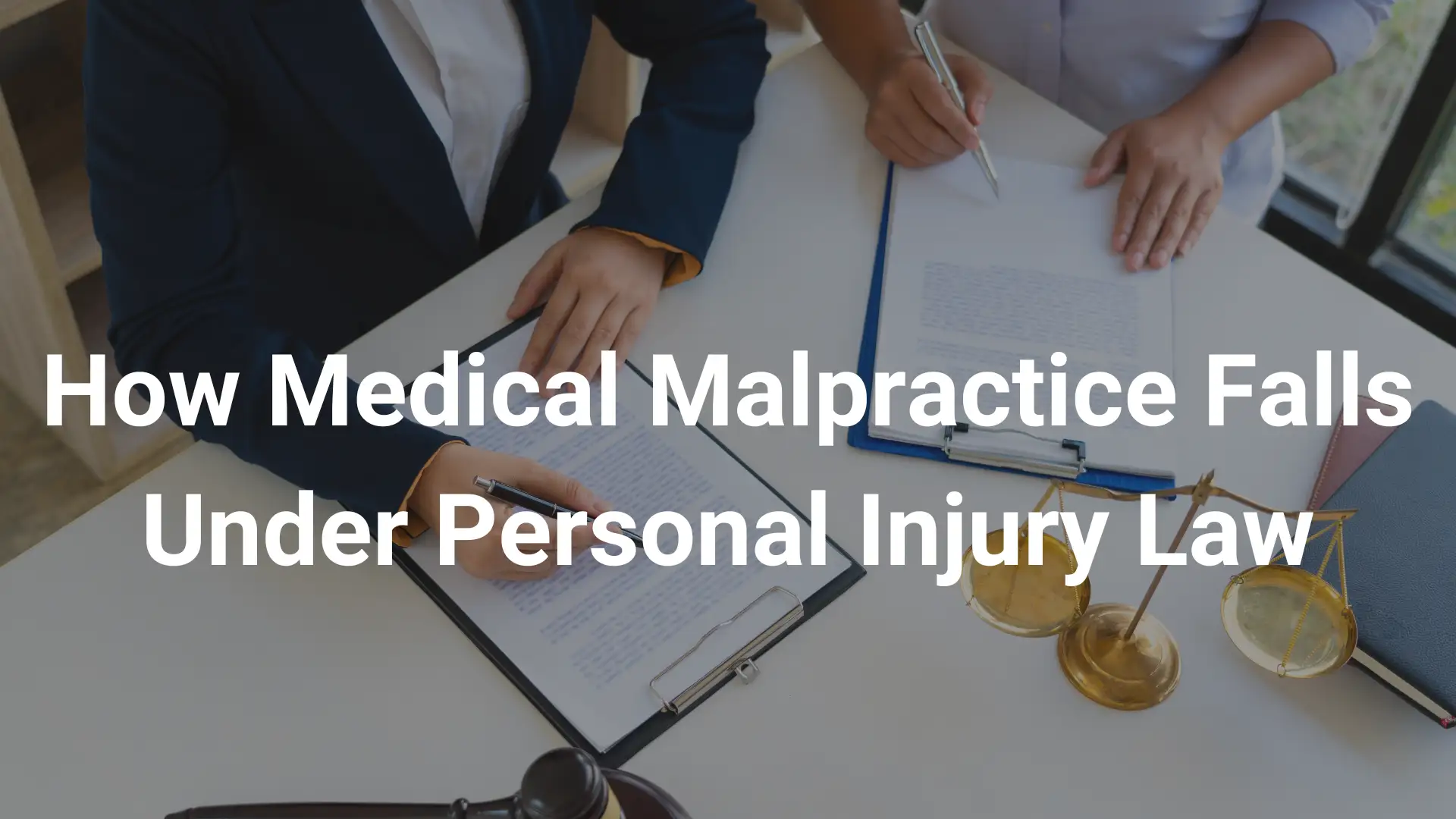
Medical malpractice claims are included in personal injury law. This body of law gives injured patients the right to pursue legal action when they have suffered harm due to a healthcare provider’s mistake. Whether it is a surgical error, misdiagnosis, or the wrong medication, these errors can cause lasting consequences.
Let’s break down the difference between medical malpractice & personal injury, and explore how medical malpractice fits within personal injury law and your legal options if you’ve been hurt by medical negligence.
Please read more common personal injury cases: Most Common Personal Injury Cases and How to Pursue a Claim.
How Medical Malpractice Differs from Other Personal Injury Cases
Unlike car accidents or slip-and-falls, medical malpractice involves complex medical standards and procedural issues. It also comes with additional legal hurdles, including:
- Expert Witness Requirements: California courts typically require testimony from another medical professional to support the claim.
- Shorter Deadlines: You have a limited window to file a hospital injury case, either three years from the date the harm was inflicted or one year from the date the injury was discovered (California Code of Civil Procedure § 340.5).
- Pre-Litigation Requirements: California law requires you to provide 90 days’ prior notice before a lawsuit can be filed.
Because of these challenges, malpractice cases demand deep knowledge of law and medicine. Working with an attorney who understands how to prove medical malpractice is critical.
Common Types of Medical Malpractice That Lead to Injury Claims
Medical malpractice doesn’t just happen in operating rooms. It can occur in hospitals, clinics, nursing homes, or routine doctor visits. Some of the most common causes of medical negligence injury include:
Misdiagnosis or Delayed Diagnosis
Doctors may fail to recognize symptoms of severe conditions like cancer, stroke, or heart attack. A misdiagnosis personal injury claim can arise if this delay in treatment leads to harm that could have been avoided with proper care.
Surgical Errors
Surgical mistake claims can involve operating on the wrong body part, leaving surgical instruments inside the patient, or causing damage during surgery. These injuries can require additional procedures and lead to long-term complications.
Medication Errors
Prescribing the wrong drug to a patient—or the wrong dosage—can cause severe allergic reactions, internal damage, or even death. If you have suffered an injury from the wrong medication, you may have grounds for a lawsuit.
Birth Injuries
Labor and delivery errors can lead to permanent damage to both mothers and infants. A birth injury claim may include injuries like cerebral palsy, brachial plexus injuries, or other trauma caused by poor decisions or errors made during childbirth.
Anesthesia Errors
Incorrect anesthesia administration can cause brain damage, coma, or death. Medical malpractice also includes failing to properly monitor a patient during surgery, which can result in severe injury, complications, or life-threatening consequences.
Negligent Post-Treatment Care
Prematurely discharging patients or failing to offer proper follow-up care can worsen their condition. When this lack of care leads to preventable complications or injuries, it may qualify as hospital negligence under medical malpractice law.
When they result in preventable harm to the patient, each error can form the basis of a medical malpractice personal injury claim in Huntington.
What You Must Prove in a Medical Malpractice Personal Injury Claim
Not all bad medical outcomes qualify as malpractice. To pursue a valid claim, you must prove that:
A Doctor-Patient Relationship Existed
You must prove the provider owed you a duty of care, which is usually straightforward. Medical records, appointment confirmations, or treatment logs often prove an established patient-provider relationship.
The Provider Acted Negligently
You must demonstrate that the healthcare provider failed to meet the accepted standard of care. This often involves comparing the provider’s actions to those a competent professional would have made in a similar situation.
Negligence Caused Your Injury
Showing that the provider made a mistake isn’t enough. You must also prove that the error directly caused your injury—whether that’s a worsened condition, unexpected complications, or harm that wouldn’t have occurred otherwise.
You Suffered Measurable Harm
Finally, you must show that the injury led to damages. These can include physical pain, mental distress, additional medical costs, or lost income. There’s no case without actual harm, even if the provider was careless.
Building a successful malpractice injury lawsuit in California requires testimony from expert medical witnesses, a thorough review of medical records, and careful evidence gathering.
What Compensation Can Be Claimed in Medical Malpractice Cases?

- Medical Expenses. This includes bills from hospitals, specialists, physical therapy, prescriptions, and even future care needs related to the injury.
- Lost Income and Earning Potential. If your injury prevents you from working or reduces your future earning ability, you may claim compensation for those losses.
- Pain and Suffering. California law allows victims to seek damages for physical pain, emotional distress, and loss of enjoyment of life.
- Additional Out-of-Pocket Costs. This could include transportation to medical appointments, mobility aids, or home modifications needed after your injury.
In some cases, victims may also seek punitive damages if their case goes to trial. To qualify for punitive damages, you must prove that the provider’s actions were malicious or fraudulent. Awards of punitive damages are rare.
To understand what your claim may be worth, speak with an attorney who can evaluate your losses and build a strong case for patient injury compensation.
Please read more about injury compensation here: How Personal Injury Compensation Is Calculated in California
Talk to a Lawyer If Medical Negligence Has Left You Injured
Do not wait to speak with an attorney if you suspect a medical error caused your injury. These cases are complex, and the clock may be ticking on your ability to file.
At DJA Injury Attorneys, we help victims of medical negligence in Huntington Beach and across Southern California get answers and take legal action. If a doctor error, injury, delayed diagnosis, or other healthcare mistake has impacted your life, we are here to help.
Our team is here to help you understand your rights and take the first step toward securing the necessary benefits. You can reach us through our contact form or call us at (949) 229-7228 for a free consultation with a California medical malpractice attorney today.
Related Post
Understanding Wrongful Death Compensation in California
What Percentage Do Personal Injury Lawyers Take from a Settlement?
